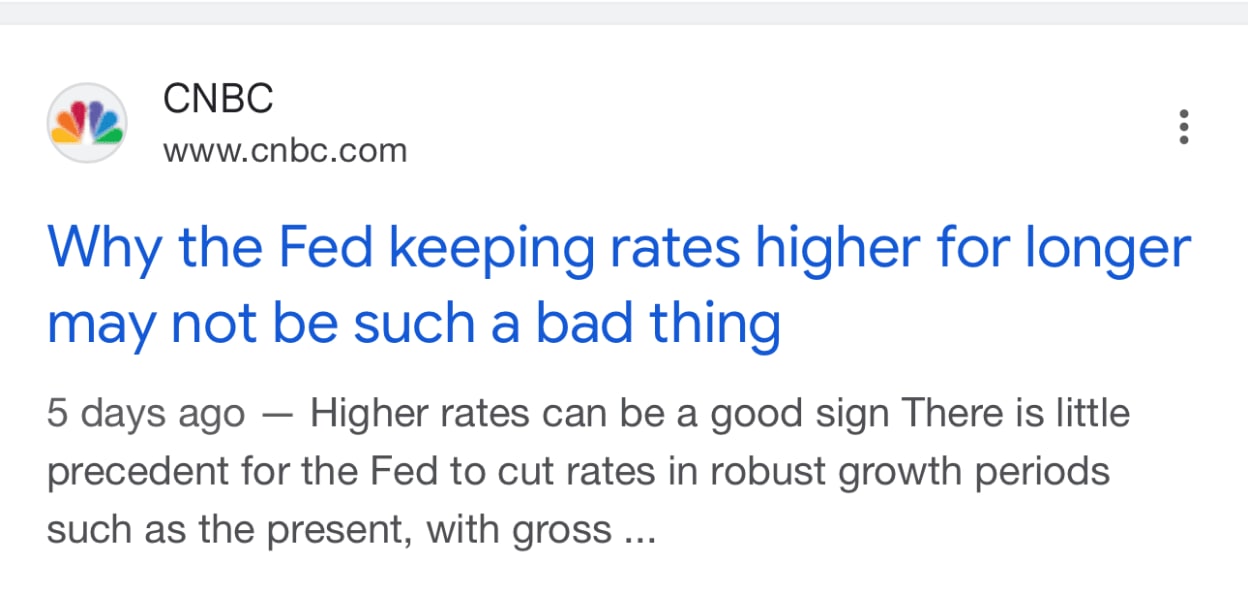Did Jerome Powell write this???
Just kidding. Just kidding.
All jokes aside, there is some truth to this headline.
Higher interest rates, often viewed negatively, actually reflect a robust strategy by the Federal Reserve to keep inflation in check. This approach not only supports savers and investors in the bond market by enhancing returns but also stabilizes the economic environment by preventing overheating.
The decision to keep interest rates elevated is a preventive measure to curb inflationary pressures without stifling economic growth. It indicates the Fed's commitment to ensuring long-term economic stability, a critical factor for financial markets and real estate investments.
GDP Report and Market Response: April 25, 2024
On April 25, 2024, the U.S. Bureau of Economic Analysis released its advanced GDP report for the first quarter, revealing an unexpectedly slow economic growth rate of 1.6%. This figure was notably lower than the previous quarter's growth rate of 3.4%, marking a significant deceleration and falling well below market expectations. The stock market responded negatively to this news, with major indices such as the Dow Jones Industrial Average, the S&P 500, and the Nasdaq Composite all closing lower. The slow growth raised concerns of stagflation, where the economy experiences stagnant growth and persistent inflation, a challenging scenario for policymakers (InvestorPlace) (News Channel 3-12).
This counterintuitive economic situation complicates the Federal Reserve's decision-making. Typically, slower GDP growth would suggest that the Fed might lower interest rates to stimulate the economy. However, ongoing high inflation rates make it risky to reduce rates, as doing so could exacerbate inflation.
PCE Report Follow-Up: April 26, 2024
The following day, on April 26, 2024, the Personal Consumption Expenditures (PCE) Price Index data was released, providing additional insight into the inflation landscape. The PCE Price Index, which is the Federal Reserve’s preferred inflation gauge, showed a monthly increase of 0.3% in March, indicating that inflation pressures remain, although they are not accelerating beyond the current high plateau. The annual inflation rate has stabilized between 2.4% and 2.6% for the past four months, still above the Fed's 2% target. This data supports the Fed's cautious stance, maintaining interest rates at a target range of 5.25% to 5.50% since July 2023, as they require more evidence of declining inflation before considering rate cuts.
Implications for the Real Estate Market
These economic indicators have direct implications for the real estate market:
- Mortgage Rates and Buying Power: With the Federal Reserve likely to maintain or even increase interest rates to combat persistent inflation, mortgage rates may stay elevated. This scenario can potentially cool down buyer enthusiasm in the real estate market as higher borrowing costs reduce the affordability of home purchases. Additionally, due to commission lawsuits, the shift from seller-paid to buyer-paid commissions, while not consistent in every real estate buyer's transaction, is intensifying concerns. This change means that in transactions where it does apply, buyers might face higher upfront costs, adding another layer of financial burden and potentially slowing down the decision-making process for prospective homeowners. For this reason, Sellers should consider how offering a buyer's commission can significantly enhance their buyer pool, making their property more attractive in a competitive market by easing potential financial hurdles for buyers.
- Investment Strategies: Real estate investors need to be wary of the broader economic conditions. Investments in areas with strong economic fundamentals may offer better protection against potential downturns.
- Long-Term Planning: Those considering buying or selling real estate should pay close attention to the Fed's policy directions, as any shifts can impact property values and market dynamics.
The interplay between GDP growth, inflation data, and Federal Reserve policy presents a complex backdrop for financial and real estate planning. By understanding these economic reports and anticipating their effects on monetary policy, real estate professionals, investors, and consumers can make more informed decisions. Staying updated on economic trends and maintaining flexible investment and financial strategies will be crucial in navigating this uncertain economic environment.
For more insights and updates, stay tuned to our blog and ensure you're equipped with the knowledge to make informed decisions in this dynamic market.
Subscribe to our weekly newsletter for the latest market insights and trends!




